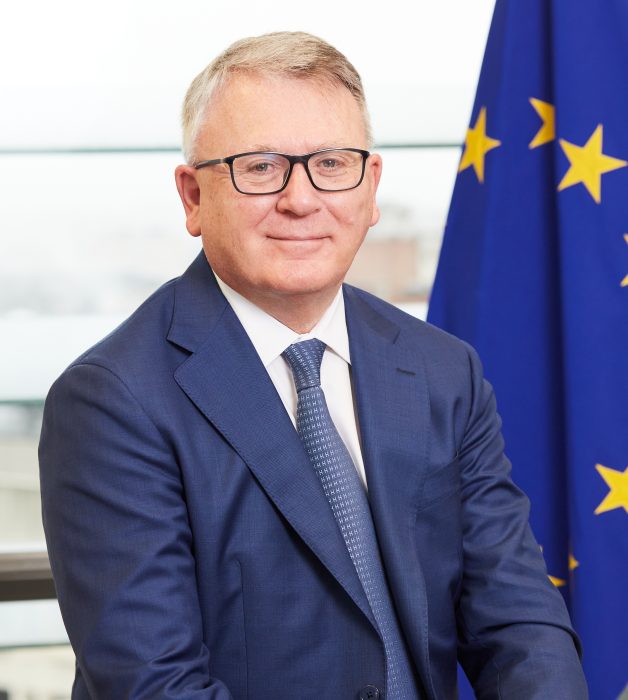The Progressive Post
Emboldening the EU’s social dimension

Jacques Delors, one of the main architects of our Union who passed away recently, left us a strong legacy: there will be no well-functioning internal market nor a robust monetary Union without solidarity, as well as without economic and social cohesion. He always regretted that the monetary Union lacked an economic, and a sufficiently strong social dimension.
Building on some progress made in the past, and particularly on the foundations of the European Pillar of Social Rights, the current European Commission – of which I am the Commissioner for Jobs and Social Rights – has taken many important steps in pushing the social agenda forward, inspired notably by the Progressives and Socialists’ election programme. This has also marked a break with the policies that had characterised the European Union during the difficult times of the financial crisis. The considerable transitions that are happening currently – green and digital – cannot succeed without integrating a strong social dimension. We need to be in the driving seat to ensure that the green transition is a fair transition, where today’s costs and tomorrow’s benefits are distributed evenly. We need to invest heavily in people’s digital skills so we can all make the most of the technology and Artificial Intelligence in our professional and personal lives, and avoid further inequalities from emerging.
The Covid-19 pandemic has shown the need to strengthen Europe’s health policy. It confirmed the importance of strong and well-equipped health systems for the resilience of our societies. Health and care work must be better valued by providing higher wages and improved working conditions.
This Commission has also developed a new approach to wage and employment policies. First, the Directive on Adequate Minimum Wages, a major achievement that also promotes collective bargaining. It is unacceptable that people who are in full-time work cannot make ends meet. We need to recognise the value of work, and the value of the workers doing their jobs. More inclusive labour markets should reduce job precariousness which is particularly affecting young people.
More than three-quarters of EU companies claim they have difficulties finding workers with the necessary skills. The Commission has launched several new initiatives to help shift attitudes towards lifelong learning. Reskilling and upskilling policies are now at the top of most governments’ agendas, thanks in part to the impetus of the European Year of Skills, and supported by the European Skills Agenda.
The economic and social impact of the pandemic has also led to a major shift towards stronger European solidarity. First, the adoption of the 100-billion-euro SURE programme which allowed member states to safeguard millions of jobs and protect small and medium enterprises. SURE is a real success story and a pioneering measure, representing the first EU social bonds. We should build on this positive experience and move towards a new instrument with a view to possible future crises affecting the labour market, factoring in the impact of the ongoing transition on the world of work. The Recovery and Resilience Facility (RRF) has not only contributed to a stronger and swifter recovery. By supporting investments and reforms aiming at inclusive and sustainable growth and upward convergence, it has also prevented the internal market from breaking up and accelerated investment in the green and digital transitions. Around a third of the RRF’s 750 billion euros have been allocated to social investments by the member states.
Finally, thanks to a clear political commitment from the EU institutions and the member states in response to the multiple crises, the ideas Delors had presented in his White Paper on Growth, Competitiveness, Employment in 1993 have now seen some kind of implementation.
In this regard, the Porto Social Summit was an important moment for this Commission and for me personally. Thanks to the support of Portugal’s Prime Minister Antonio Cósta, the Action Plan for the Pillar of Social Rights was endorsed and three major social targets to achieve by 2030 were approved:
- an employment rate of at least 78 per cent;
- 60 per cent of the workforce benefitting from at least one training opportunity per year;
- a reduction of at least 15 million of the number of people at risk of poverty, among whom at least 5 million children.
Porto has represented a paradigm shift for the social dimension of the EU. It has set the objective of building a stronger Social Europe in the context of ongoing green and digital transition while setting out a clear roadmap where the social and employment policies have to go hand in hand with green, digital, industrial and economic policies.
All member states have set their own national targets to help meet these EU-level targets. Progress needs to be assessed now, and targets may have to be adapted and enriched. Fighting poverty must become one of the major priorities for the next mandate of the European Commission as our societies risk becoming more divided and more unequal.
The adoption of the European Child Guarantee represents an important achievement in the fight against inequality and social exclusion, as does the adoption of the Recommendation on Adequate Minimum Income, and of the European Platform for Combatting Homelessness. Investing in our welfare system is key not only to fighting for social progress but also to enhancing the resilience and competitiveness of the EU model in a very challenging international environment.
Addressing the big changes in the world of work should also be high on the agenda. Artificial intelligence is a central aspect where the EU should set the right standards in the sense of a human-centred approach. The final adoption of the Platform Directive is of utmost importance if we want to protect social and labour rights. Of the 28 million people believed to do platform work, 5.5 million may be misclassified as self-employed while, in reality, they are workers. This means they could be missing out on things like minimum wages, parental leave and sickness benefits.
We have also made important progress in health and safety at work, notably by setting new lower exposure limits for asbestos and other, hazardous substances. In the future, more attention should be given to psycho-social diseases and the mental health of workers, a dramatically increasing issue.
As we have seen recently in different sectors like road transport, there is a need to strengthen fair mobility. It is, therefore, indispensable to enlarge the competencies of the European Labour Authority. We also need to promote the democratisation of the workplace. The incumbent Commission has constantly promoted social dialogue and collective bargaining. The proposal for stronger European Works Councils is another important step which needs to be followed by new initiatives. Change can often be disruptive, but the existence of European Works Councils allows workers to be included in the decision-making process when it comes to things like restructuring or relocation.
The Belgian Presidency has set clear social objectives for the summit in La Hulpe, which will be held in April. It is the moment to assess, consolidate and launch new avenues in implementing the European Pillar of Social Rights. Our objective is to provide concrete answers to our citizens’ needs, aiming at social progress and shared prosperity.
This will be an important message to European citizens a few weeks before the European elections. Populists do not offer solutions to their concerns. They only stoke their fears. We need to strengthen Social Europe to show citizens that we care about their concerns. The European elections will ultimately be about the kind of European society we want. We must defend our democratic rights, and fight for a society of equality, without discrimination.
Please have a look at the #SocialEurope campaign of the Party of the European Socialists Group in the Committee’s of the Regions.
Photo credits: European Union




